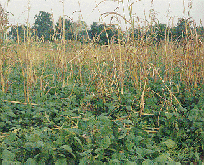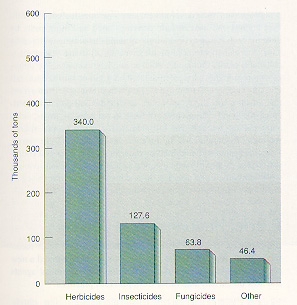
Photo From Farm Journal, Feb. 1994
 Photo From Farm Journal, Feb. 1994 |
Many farmers choose to use chemicals to keep weeds and pests from destroying their crops and to add more nutrients to the soil. There are three different kinds of pesticides; herbicides, insecticides and fungicides. All three of these pesticides are used to kill different kinds of pests that can be found on a farm. Farmers that make the decision not to use any chemicals are called organic farmers. |

Many people, including farmers, question what kind of impact chemicals have on our ecosystem. Many farmers believe that if they are very careful to control where they spray chemicals, and how much they spray, pesticides and fertilizers can be helpful and safe in farming.
Some farmers disagree. One of the reasons that they feel differently is because of something called pesticide resistance and resurgence. When a field is sprayed with a
pesticide, not all of the insects will die, and the ones that remain will produce offspring that will also be tolerant to the spray. This forces farmers to use more and different kinds of pesticides, so they can kill all of the insects that might destroy their crop. The problem is that some insects will always survive so that the farmer will have to continue to add more chemicals. Another reason some farmers do not like to use chemicals is because if the chemicals are not controlled very carefully they can get carried away by run-off and eventually end up in a water source.
| This is a graph of agricultural pesticide use in the United States in 1992. You can see that herbicides are used in the highest quantities. This is because while weeds will allways grow and always be a problem for famers, insects will only attack an unhealthy plant. |  |
Click HERE to see a table of common farm chemicals!


